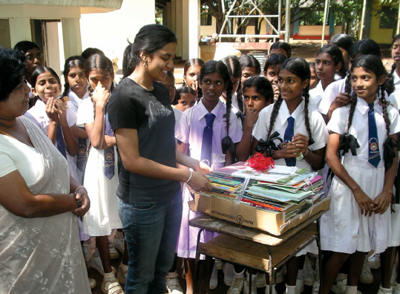Sarasi Jayaratne '12 works to bring books to the children of Sri Lanka, a nation ravaged by natural disaster and civil war
Sarasi Jayaratne '12 works to bring books to the children of Sri Lanka, a nation ravaged by natural disaster and civil war
In the dark hours of a jungle night in 2007, Sarasi Jayaratne '12 lay in bed listening to the sound of Sri Lankan security forces cleaning their weapons outside the windows of her guest house. She also heard them speaking in hushed tones about the likelihood of an attack from the Tamil Tiger rebel troops positioned within shooting range of the village.

Such nights were the norm for these villagers, but it was fraught for a teenage Girl Scout and high school sophomore from suburban Virginia. She slept with her passport under her pillow.
Jayaratne, daughter of Sri Lankan-born parents, was on the teardrop-shaped island in the Indian Ocean pursuing a mission she'd launched as a high school freshman. That project has grown into the Keep Reading Foundation, which has so far shipped close to 20,000 English-language books to more than fifty schools in rural Sri Lanka.
Her odyssey began on Christmas Eve 2004, when a magnitude-9.1 earthquake on the ocean floor near Sumatra caused a tidal wave that overwhelmed the coast of Sri Lanka and also ravaged parts of Indonesia, Thailand, and southern India. In Sri Lanka, more than 160,000 people died and thousands of others were left homeless. In the wake of the devastation, 168 schools lay in ruins or had vanished completely. "I remember watching CNN all that day thinking, 'I would not know what to do if I didn't have a school,' " she says. "I decided to do whatever I could to help those children get their education back on track."
Aiming to replenish the libraries of schools under reconstruction or convening under tents, Jayaratne reached out to her Girl Scout troop and began a fund-raising drive that garnered $150 the first day. She wrote and collected letters to members of Congress and visited the Sri Lankan embassy in Washington, D.C. (twice, because of an ambassador change). Doors opened. Her simple, articulate appeal won over scores of policymakers, neighbors, friends, and ultimately the children and teachers she would meet on her trips to Sri Lanka. "The children treated me like a superstar," Jayaratne says. "They were so happily surprised that a teenage girl—someone almost their age— could do something like this for them."
English is a secondary language in Sri Lanka, whose people mainly speak Sinhalese or Tamil dialects. However, most of the country's universities are modeled on the British educational system, where English is the lingua franca—and Jayaratne says it has an important role as a bridge language. The civil war between Sinhala and Tamil ethnic groups may have ended, but tensions remain high; Jayaratne believes that increasing English literacy for both groups could serve as a uniting force.
Jayaratne has traveled to Sri Lanka four times as part of her efforts to distribute books written for children roughly aged five to twelve. The donations include English language primers and textbooks as well as books from Mother Goose to Harry Potter; shipping costs average $400 to $500 per batch of about twenty boxes. During her 2007 trip, Jayaratne met a retired English teacher who now heads the Keep Reading Foundation's Sri Lankan branch, a connection that has helped the group reach into more remote parts of the country. Jayaratne's group has also worked closely with the Janavijaya Foundation, a nonprofit, faith-based organization that provided disaster relief for victims of the 2004 tsunami.
Her most recent trip, in January, had its harrowing moments, as the countryside was flooded by relentless monsoon rains. Accompanied by her parents, she traveled across a sodden landscape marked by mudslides and flooded roads. Their efforts were met by enthusiastic students from ten schools who came despite the deluge. In a relatively dry spot, they listened to the tall young woman from America talk about the importance of education, and her gift of books earned ceremonial honors. Included in the donations were hundreds of pairs of reading glasses, since corrective lenses are almost nonexistent in many rural areas.
In photos of her trips, the school-children appear in traditional uniforms— the girls in white shirts, ties, and skirts; the boys in white shirts, ties, and dark pants—giving the collective impression of orderliness and even economic stability. Jayaratne was surprised by their neat appearance—until she was advised to judge the children's relative well-being by looking at their feet. "Some of them had worn-out shoes or no shoes at all," she says. "I learned that many of them are very poor and must walk long distances just to get to school."
For her efforts as a Girl Scout, Jayaratne received a Gold Award, the organization's highest honor. At Cornell, where she is majoring in biology with an eye toward become a doctor, she serves as a co-leader of the Sri Lanka Association and is studying Sinhalese, so she can communicate better during her trips abroad. "When I visit those children, all of the troubles I face in trying to help them disappear," she says. "When I see that it makes them truly happy that someone from far away cares about their future, it gives me hope that we really can do something to change the world."
— Franklin Crawford


